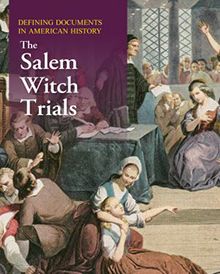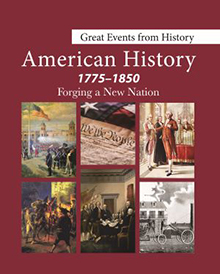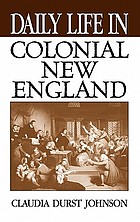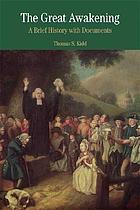 Go to A-Z Databases: Books & eBooks to search for more eBooks. Must be on campus or login with your COM account for off campus access.
Go to A-Z Databases: Books & eBooks to search for more eBooks. Must be on campus or login with your COM account for off campus access.
Want more on finding books or eBooks? Try our How to Use Books & eBooks guides.
 British Colonial America : People and Perspectives
This insightful set of essays reveals the day-to-day lives of the British colonists who laid the foundation for what became the United States. * Each chapter is authored by a published expert on the social aspects of life in colonial British America * A primary sources section includes travel diaries, newspaper articles, legislative documents, sermons, and other material that provides insight into the colonial experience
British Colonial America : People and Perspectives
This insightful set of essays reveals the day-to-day lives of the British colonists who laid the foundation for what became the United States. * Each chapter is authored by a published expert on the social aspects of life in colonial British America * A primary sources section includes travel diaries, newspaper articles, legislative documents, sermons, and other material that provides insight into the colonial experience
 Defining Documents in American History : The Salem Witch Trials
The Salem Witch Trials, which took place in colonial Massachusetts between 1692 and 1693, have become indicative of mass hysteria, religious extremism, and false accusations occurring outside the fair and just rule of law. But what may not be as commonly known is that they were part of a wider phenomenon at the time - a fear and prosecution of witchcraft stemming back to Europe in the 1400s that led to the deaths of upwards of 60,000 people, most of them women. In Europe, these witch-hunts were notably severe in the Holy Roman Empire, and reached a peak between 1560 and 1630, also occurring in Scotland and England, as well as other European nations to varying degrees. As the fervor in Europe began to wane in the latter half of the 17th century, the sentiment continued in the fringes and made its way to the New World, with the earliest documented execution for witchcraft occurring in Connecticut in 1647. Increasingly fearful and vitriolic rhetoric, publications attempting to prove the existence of witches and demons, and growing mass hysteria led to the dramatic and deadly events in Salem, in which more than 200 people were accused of witchcraft and more than 20 were put to death. This volume explores the development of witch-hunts in the New World, from early incidents in Connecticut to the major events in Salem, as well as precedents in Europe, and later cultural reverberations such as hysteria over perceived Satanic ritual abuse in the 1980s. Documents examined include historical accounts, book excerpts, court cases, religious doctrines, petitions, and more.
Defining Documents in American History : The Salem Witch Trials
The Salem Witch Trials, which took place in colonial Massachusetts between 1692 and 1693, have become indicative of mass hysteria, religious extremism, and false accusations occurring outside the fair and just rule of law. But what may not be as commonly known is that they were part of a wider phenomenon at the time - a fear and prosecution of witchcraft stemming back to Europe in the 1400s that led to the deaths of upwards of 60,000 people, most of them women. In Europe, these witch-hunts were notably severe in the Holy Roman Empire, and reached a peak between 1560 and 1630, also occurring in Scotland and England, as well as other European nations to varying degrees. As the fervor in Europe began to wane in the latter half of the 17th century, the sentiment continued in the fringes and made its way to the New World, with the earliest documented execution for witchcraft occurring in Connecticut in 1647. Increasingly fearful and vitriolic rhetoric, publications attempting to prove the existence of witches and demons, and growing mass hysteria led to the dramatic and deadly events in Salem, in which more than 200 people were accused of witchcraft and more than 20 were put to death. This volume explores the development of witch-hunts in the New World, from early incidents in Connecticut to the major events in Salem, as well as precedents in Europe, and later cultural reverberations such as hysteria over perceived Satanic ritual abuse in the 1980s. Documents examined include historical accounts, book excerpts, court cases, religious doctrines, petitions, and more.
 Great Events from History : American History, 1775-1850--Forging a New Nation
Great Events from History : American History, 1775-1850--Forging a New Nation
 Handy Answer : Native American Almanac - More Than 50,000 Years of the Cultures and Histories of Indigenous Peoples
From ancient rock drawings to todays urban living, the Native American Almanac: More Than 50,000 Years of the Cultures and Histories of Indigenous Peoples traces the rich heritage of indigenous people. It is a fascinating mix of biography, pre-contact and post-contact history, current events, Tribal Nations histories, enlightening insights on environmental and land issues, arts, treaties, languages, education, movements, and more.
Handy Answer : Native American Almanac - More Than 50,000 Years of the Cultures and Histories of Indigenous Peoples
From ancient rock drawings to todays urban living, the Native American Almanac: More Than 50,000 Years of the Cultures and Histories of Indigenous Peoples traces the rich heritage of indigenous people. It is a fascinating mix of biography, pre-contact and post-contact history, current events, Tribal Nations histories, enlightening insights on environmental and land issues, arts, treaties, languages, education, movements, and more.
![]()
Go to OneSearch to search for more print books.
Want more on finding print books? Try our How to Use OneSearch guide.
 Daily Life in Colonial New England
This books is part of a series that covers many periods in American and European history. See all the books in the series.
Daily Life in Colonial New England
This books is part of a series that covers many periods in American and European history. See all the books in the series.
 Defining Documents in American History : The Salem Witch Trials
The Salem Witch Trials, which took place in colonial Massachusetts between 1692 and 1693, have become indicative of mass hysteria, religious extremism, and false accusations occurring outside the fair and just rule of law. But what may not be as commonly known is that they were part of a wider phenomenon at the time - a fear and prosecution of witchcraft stemming back to Europe in the 1400s that led to the deaths of upwards of 60,000 people, most of them women. In Europe, these witch-hunts were notably severe in the Holy Roman Empire, and reached a peak between 1560 and 1630, also occurring in Scotland and England, as well as other European nations to varying degrees. As the fervor in Europe began to wane in the latter half of the 17th century, the sentiment continued in the fringes and made its way to the New World, with the earliest documented execution for witchcraft occurring in Connecticut in 1647. Increasingly fearful and vitriolic rhetoric, publications attempting to prove the existence of witches and demons, and growing mass hysteria led to the dramatic and deadly events in Salem, in which more than 200 people were accused of witchcraft and more than 20 were put to death. This volume explores the development of witch-hunts in the New World, from early incidents in Connecticut to the major events in Salem, as well as precedents in Europe, and later cultural reverberations such as hysteria over perceived Satanic ritual abuse in the 1980s. Documents examined include historical accounts, book excerpts, court cases, religious doctrines, petitions, and more.
Defining Documents in American History : The Salem Witch Trials
The Salem Witch Trials, which took place in colonial Massachusetts between 1692 and 1693, have become indicative of mass hysteria, religious extremism, and false accusations occurring outside the fair and just rule of law. But what may not be as commonly known is that they were part of a wider phenomenon at the time - a fear and prosecution of witchcraft stemming back to Europe in the 1400s that led to the deaths of upwards of 60,000 people, most of them women. In Europe, these witch-hunts were notably severe in the Holy Roman Empire, and reached a peak between 1560 and 1630, also occurring in Scotland and England, as well as other European nations to varying degrees. As the fervor in Europe began to wane in the latter half of the 17th century, the sentiment continued in the fringes and made its way to the New World, with the earliest documented execution for witchcraft occurring in Connecticut in 1647. Increasingly fearful and vitriolic rhetoric, publications attempting to prove the existence of witches and demons, and growing mass hysteria led to the dramatic and deadly events in Salem, in which more than 200 people were accused of witchcraft and more than 20 were put to death. This volume explores the development of witch-hunts in the New World, from early incidents in Connecticut to the major events in Salem, as well as precedents in Europe, and later cultural reverberations such as hysteria over perceived Satanic ritual abuse in the 1980s. Documents examined include historical accounts, book excerpts, court cases, religious doctrines, petitions, and more.
 The Great Awakening : A Brief History with Documents
* Mainly secondary, but includes primary documents.
The Great Awakening : A Brief History with Documents
* Mainly secondary, but includes primary documents.
 Great Events from History : American History, 1775-1850 -- Forging a New Nation
Great Events from History : American History, 1775-1850 -- Forging a New Nation
 Many Thousands Gone : The First Two Centuries of Slavery in North America
In the late 1990s, most Americans, black and white, identify slavery with cotton, the deep South, and the African-American church. But at the beginning of the 19th century, after almost 200 years of African-American life in mainland North America, few slaves grew cotton, lived in the deep South, or embraced Christianity. This text traces the evolution of black society from the first arrivals in the early-17th century through to the Revolution. In telling their story, Ira Berlin, a leading historian of southern and African-American life, reintegrates slaves into the history of the American working class and into the tapestry of the nation.
Many Thousands Gone : The First Two Centuries of Slavery in North America
In the late 1990s, most Americans, black and white, identify slavery with cotton, the deep South, and the African-American church. But at the beginning of the 19th century, after almost 200 years of African-American life in mainland North America, few slaves grew cotton, lived in the deep South, or embraced Christianity. This text traces the evolution of black society from the first arrivals in the early-17th century through to the Revolution. In telling their story, Ira Berlin, a leading historian of southern and African-American life, reintegrates slaves into the history of the American working class and into the tapestry of the nation.
 Featuring series that have multiple titles for this topic. Must access on campus or login with your COM account for off campus access for eBooks.
Featuring series that have multiple titles for this topic. Must access on campus or login with your COM account for off campus access for eBooks.
Want more on finding books? Try Books & eBooks.
© 2024 COM Library
1200 Amburn Road, Texas City, Texas 77591
409-933-8448 . FAX 409-933-8030
This work is licensed under a Creative Commons Attribution-NonCommercial 4.0 International License